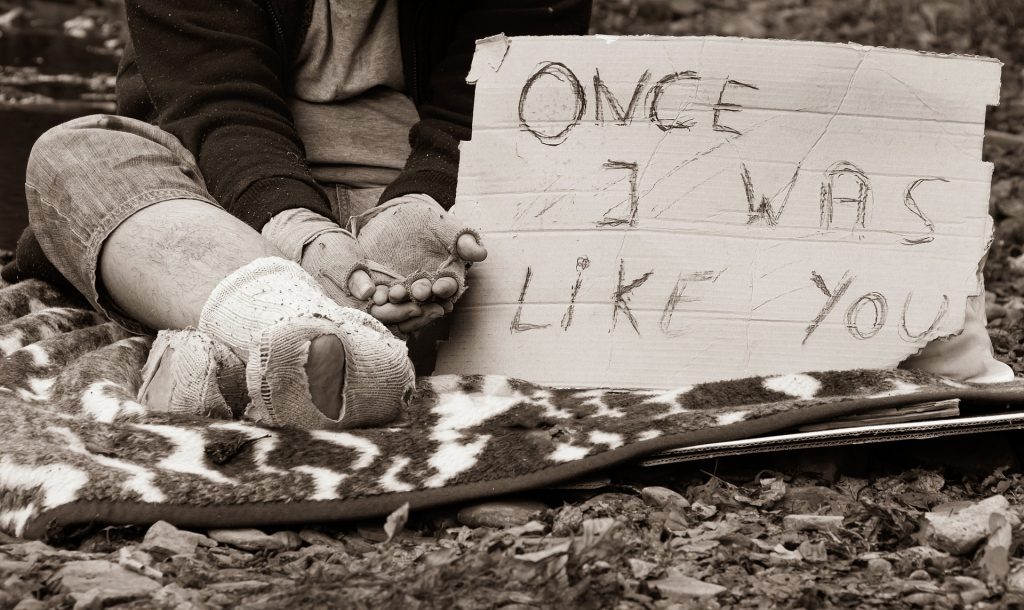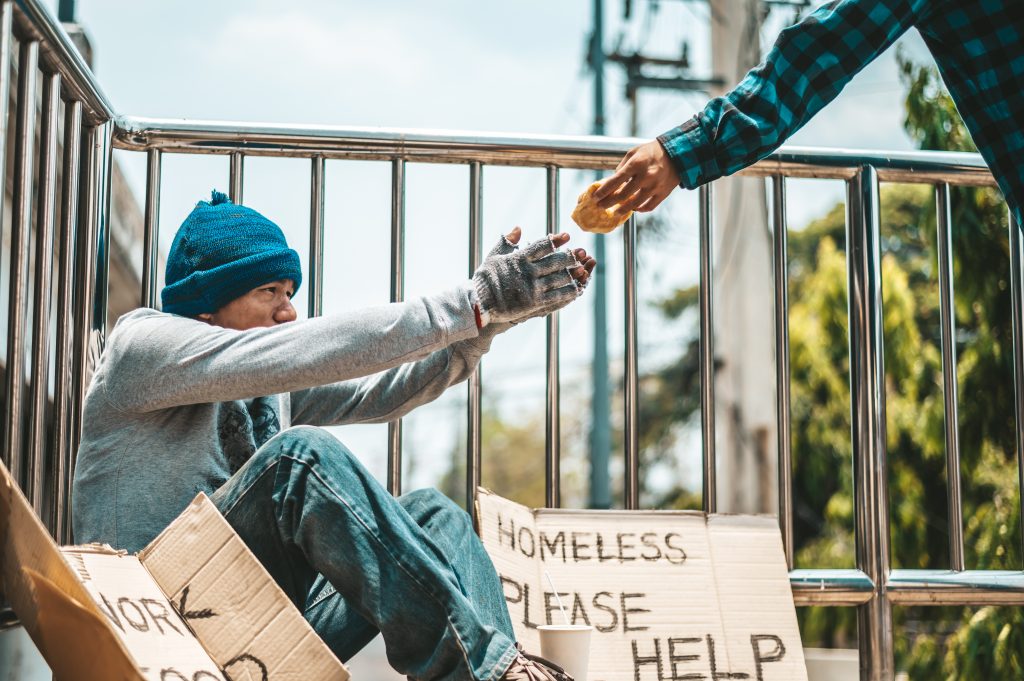When I first started working in homeless services five years ago, I opened myself up to many surprises and experiences. One of the most surprising, though, was how quickly and frequently people in my life (friends, relatives, even strangers) would, upon hearing about my line of work, want to talk about one thing and one thing only: what to do when a person experiencing homelessness asks for money.
There are so many versions of this inquiry:
“What do I do?”
“Should I give them money?”
“Aren’t they going to just spend it on drugs/alcohol?”
“Am I just enabling them?”
“Should I give to a shelter instead?”
Often, it’s not even an inquiry, but more of a confession: “Most of the time I give them something if I have cash,” or, “I never give them any, NOT because [fill in the blank] but because [different reason].” In these instances, I’m aware that they are looking to me to confirm or rebuke their line of thinking, to absolve them of their insecurity about the issue.
And I get it! It’s an anxiety-inducing situation. These encounters are strange and awkward, like when someone shows up to your door to sell you something. Even after five years working in direct service, I still get anxious when I get hit up for money. I can only imagine how awkward it must be for the person asking for money – to be that desperate, holding both the likelihood of failure and the necessity of success.
But I’m here to give you the secret to unlocking this interaction and walking away feeling okay about it. Are you ready?
Just ask yourself one question: “Do I want to give this person money?”
If Yes: give them the money.
If No: don’t give them the money.
Does this underwhelm you? I thought it might. I truly believe it comes down to that one simple question. However, there’s a lot behind the question that can be unpacked. So let’s dig in.
Boundaries
To have this conversation well, we have to talk about your personal boundaries. We don’t talk about boundaries enough in our lives, relationships, and communities. In homeless services, though, we talk about boundaries all the time. Boundaries must exist in homeless services, because the demand so greatly exceeds the “supply.” There is not enough housing, case management, food or clothing or whatever resource to go around, and certainly not enough time to provide them at the rate at which people need them (at least in the way these systems are currently arranged/funded.)
I often remind our new hires of a sobering truth: “If you and I and everyone at our organization worked 24/7 for the next year, we would not solve homelessness in Los Angeles. In fact, we would actually burn ourselves out after a week, tops, and we’d be of no use to anyone. Boundaries means choosing and sticking to the things that you’re not going to do so that you actually have capacity to do the things you need to do, and do them excellently.”
What does this have to do with people asking you for money? Well, everyone needs to know their boundaries walking in to that conversation. Boundaries need to be in place before they are crossed. When boundaries that weren’t decided ahead of time get crossed, the person inevitably will feel angry and resentful to the person who crossed them, even if they didn’t know they were there.
I have my own boundaries around these interactions as a services professional. I will never say “Yes” if I am in Hollywood, because that’s where I work. Someone might recognize me as working at The Center, or see me there later, and now I’ve potentially created a relational dynamic that is harmful for our organization and what we’re trying to do. However, I don’t live in Hollywood; so when I am out in other neighborhoods, my boundaries are different. Typically, if I have cash that is not already spoken for, I will give it to someone if they ask.
For my own moral clarity, I try to make this a blanket policy so that I don’t allow any unconscious biases to affect who I give to and who I don’t. (These biases can be gendered, racial, or even as innocuous seeming as how “dirty” they are, or how I evaluate their mental health.) To be fair, I almost never have cash. I don’t want to give you the impression that I’m walking around LA passing out $20’s to whomever asks. I probably end up giving to someone 10 times a year at the most (pre-COVID.)
But those are my boundaries: not in Hollywood, and only when I have cash. With any boundaries, though, there are flexibilities. One time, I was trying to get a walk-in haircut at a plaza that also had restaurants. I was told I would probably wait 30 minutes before they could take me, so I started walking around the plaza to kill time. A man approached me, and I knew I had no cash, but also that I had some time to spare. He asked if I could buy him dinner at one of the restaurants, his favorite place. I said Yes, and bought him the meal.
Another time, quite recently, I was walking and got asked if I could lend a few bucks. I didn’t have cash, which I told him. He, a younger guy, maybe 22, smiled and responded, “No problem man… hey, I can do CashApp or Venmo too though!” I was caught off guard, but just smiled and responded back, “Sorry, I can’t.” He understood, and we both went about our day.

Everyone needs to develop their own boundaries, identifying which ones are rigid and which are flexible. Maybe you are like me, and want to specify certain areas where you will or won’t give. Maybe you will make it dependent on whether you have cash, whether you are alone, whether you are in a hurry; maybe you’d rather give food, a gift card, or some other resource like socks or a hygiene kit.
One of the most important reasons to have boundaries is for safety. As a tall, stocky white male, I recognize that walking alone on a street, even at night, and even being approached by a stranger rarely makes me feel unsafe. This is a privilege I have, and one that I often have to be reminded is not universal. Your boundaries can and should include thoughts about your comfort and safety. The time of day, whether or not you are alone – all of these could be part of your boundaries. At the same time, you should also be sure to question if any of your intuitions about your safety in an interaction or at all guided by implicit bias; I always tell new volunteers to trust their instincts about comfort/safety, but for staff and long-term volunteers, we also encourage people to investigate those instincts over time.
If you don’t have these boundaries, you will continue to enter these situations with anxiety – anxiety that stems from, like my new hires, a desire to do something, uncertainty about what exactly can be done, and knowing that you have the means to help some but not all who ask. These boundaries will help you answer confidently, which gives dignity to the conversation and all parties involved in it. (More on that shortly.)
These boundaries will always be personal to you and your own comforts. With that said, you should be careful to make sure they are not based on falsehoods or stereotypes.
Assumptions
Without a doubt, many of our boundaries are based on assumptions about homelessness and the people experiencing it. It’s important that as you develop your personal boundaries around this issue that you do so in a way that is thoughtful toward the population you’re considering. When you ask yourself the question, “Do I want to give this person money?” you can let your Yes or No be final in the moment. But you may want to reflect later on what assumptions underlie your response, especially your No’s.
I saw a Tweet recently where someone was recounting a childhood memory – they were walking with their dad and someone asked them for money. The dad happily gave it, and once they were far enough away, the child asked, “Why did you give him money, aren’t you worried he’s going to waste it on drugs?” The dad responded, “If he uses the money to do those things, that says something about who he is. But if someone in need asks me for help and I don’t give it to them, that’s says something about who I am.”
I appreciate the sentiment, with a couple notes. Of course, there are no implied boundaries to this posture, so we must hope that the father lives in an area with very little poverty, lest he go broke trying to constantly prove what kind of person he is. Secondly, attaching a person’s inherent goodness to whether they spend money fueling an addiction is overly dismissive of a complicated problem, and lacks both grace and nuance.
Ultimately, though, this is a posture that has grown in popularity, and I more or less agree with it. The assumption that a person experiencing homelessness will spend your generous donation on drugs or alcohol is pervasive in a way that absolutely does not align with data. The numbers of people struggling with substance use and addiction is lower than the general assumption, though it is still a major part of the conversation.
More to the point, addiction is such that it drives a person to pursue the substance they crave through any and every obstacle. While I’ve seen many people through recovery, and many who are far from it, I’ve never once heard of someone who kicked their addiction because they ran out of money. Even though this narrative affects so much giving behavior, I’ve not once heard someone say, “I was about to give up and stop using heroin forever, but then that nice lady gave me $20 and I was able to score.”
Frankly, even if they are planning to spend your money for that, you might be preventing far riskier behavior in order to meet that perceived need. That feels “icky” to many of us, perhaps like we are enabling bad behavior. While this conversation exceeds the limitations of this piece, it is worth pointing out that the gift of money to a person has little to no effect on their ability to manage addiction. Only larger interventions like treatment, healthcare, and housing can interrupt something of that magnitude.
Sometimes, we wonder if giving cash is even helpful to the problem of homelessness. And to be fair, I’ve never seen someone lift themselves out of homelessness based on the money made from solicitation, (except when someone was trying to get a bus ticket or gas money back to a place they have refuge.) However, I have seen that money buy someone a clean pair of socks. I’ve seen it allow someone the dignity of a meal at their favorite restaurant after a hungry day. I’ve seen it buy someone a weekend in a hotel to get out of the rain, or just to take a brief respite before returning to the streets. These are not nothing. Your gift may not lift someone out of their desperate situation, but it might provide an immeasurable amount of solace and even joy in the midst of their despair.
Above all else, homelessness dehumanizes. It isolates, it discards, and it amplifies the fear we all have that maybe things aren’t going to work out for us. In your daily interactions with people experiencing homelessness, their homelessness is not truly at stake. Their humanity, though, is – whether you end up giving them money or not.
Human Interaction
When you interact (or don’t interact) with any individual experiencing homelessness – whether they are asking you money or you are just walking past them, so much is communicated. I hear from unhoused people all the time how keenly aware they are that people look away, change course, and avoid eye-contact. These are impulses that we act on consciously and unconsciously. I’m convinced that we do these things because homelessness itself – more than the individuals experiencing it – scares us. We are afraid to reckon with the way our economy and society churn out victims, and it’s easier just not to look.
But if we could look…what a difference it would make, for them and for us. If we went against our impulses and made eye contact, perhaps even smiled or nodded at one another, acknowledging our shared existence and humanity, we all might just become a little more human in the process.
Let’s return to the type of interaction we’ve been focused on. A person has asked you for money, and in this scenario, you are not going to give them the money. What do you do? How do you say it? What if they get upset?
The thing I see most commonly is people pretending not to hear the question and continuing to walk as if the person is invisible. I have done this in the past, before I began my work in homeless services, so I understand it. But I cannot stress this enough: please, do not do this. Anything is better than this: say “Sorry” or “I can’t” without giving a reason. Anything is better than the silent, invisible treatment.
Even lying.
A different scenario: you’re at a party, and you start talking with a friend-of-a-friend. You’re maybe familiar with this person, but don’t consider them your friend. They are chatting you up, and you get the sense that you don’t particularly like this person. But they seem to really like you. Toward the end of the conversation, they suggest you should hang out sometime. (Let’s assume this is not a flirting situation, just friendly.) What do you say?
I imagine most of us would give some sort of half-hearted affirmation, like, “Yeah, for sure.” Why do we do this? Why do we offer a soft acknowledgement regardless of our intentions? Because often, due to our shared humanity and awkwardness, it’s kinder to be a little disingenuous than to tell someone what you’re thinking: “I do not want to hang out with you because I don’t like you.” You can almost hear the record-scratch, and everyone at the party turning to look at the jerk who would say such a thing to a fellow person.
Push it a little further: what if when you say, “Yeah, for sure,” they come back with: “How about tomorrow? I have tickets to a pottery class!” You hate pottery. That sounds terrible. But you have no plans. What do you say? I would bet that you’re likely to say that you can’t, or even lie and say you have plans; because it’s kinder, and the person is still a human.

The point is, we do this kind of thing all the time, and we can do it without guilt in our conversations with people asking for money. You would never just go silent with the person at the party and pretend they don’t exist. You would find some way to get out of it that kept their dignity intact, as well as your boundaries. You should do the same when you interact with people experiencing homelessness.
So what do I do about homelessness, then?
If at the end of all of this you’re asking that question, good on you. This is the issue so many of us are working on, and for which there are real, attainable solutions. The people you encounter deserve your dignity, but they also need systemic change. If you want to be a part of that, here are a few good starting points.
Get to know your local service providers. There are shelters, food lines, drop-in centers, and housing organizations in your area. Support them financially if you can – even if they take government contracts and grants, those often leave a lot to be desired in terms of extra money to make sure the service are provided with dignity. You can also support them by volunteering, or donating goods. (But please find out first if they want them – there is little more frustrating at my job when I show up at 7am to find garbage bags full of donations that we can’t use blocking our entryway because a “good Samaritan” decided to do spring cleaning.)
But not all service providers are created equally. That’s why you should also get to know the advocates, activists, and coalitions in your area. Often, they know who the service providers are who truly care and want to make a difference, and those who are just in it for the funding or operate in substandard or dehumanizing ways. Additionally, these groups can and do speak openly about local and national policies and politicians and how they affect life on the streets. This will help you leverage your voting power to create systemic change.
Psychologist Henry Stack Sullivan says, “We are all more human than we are otherwise.” However you choose to interact with homelessness or the people experiencing it, whether it is by giving money or not, donating or not, educating yourself or not – if you can hold everyone’s humanity at the forefront, you will be doing just fine.


Comments are closed.